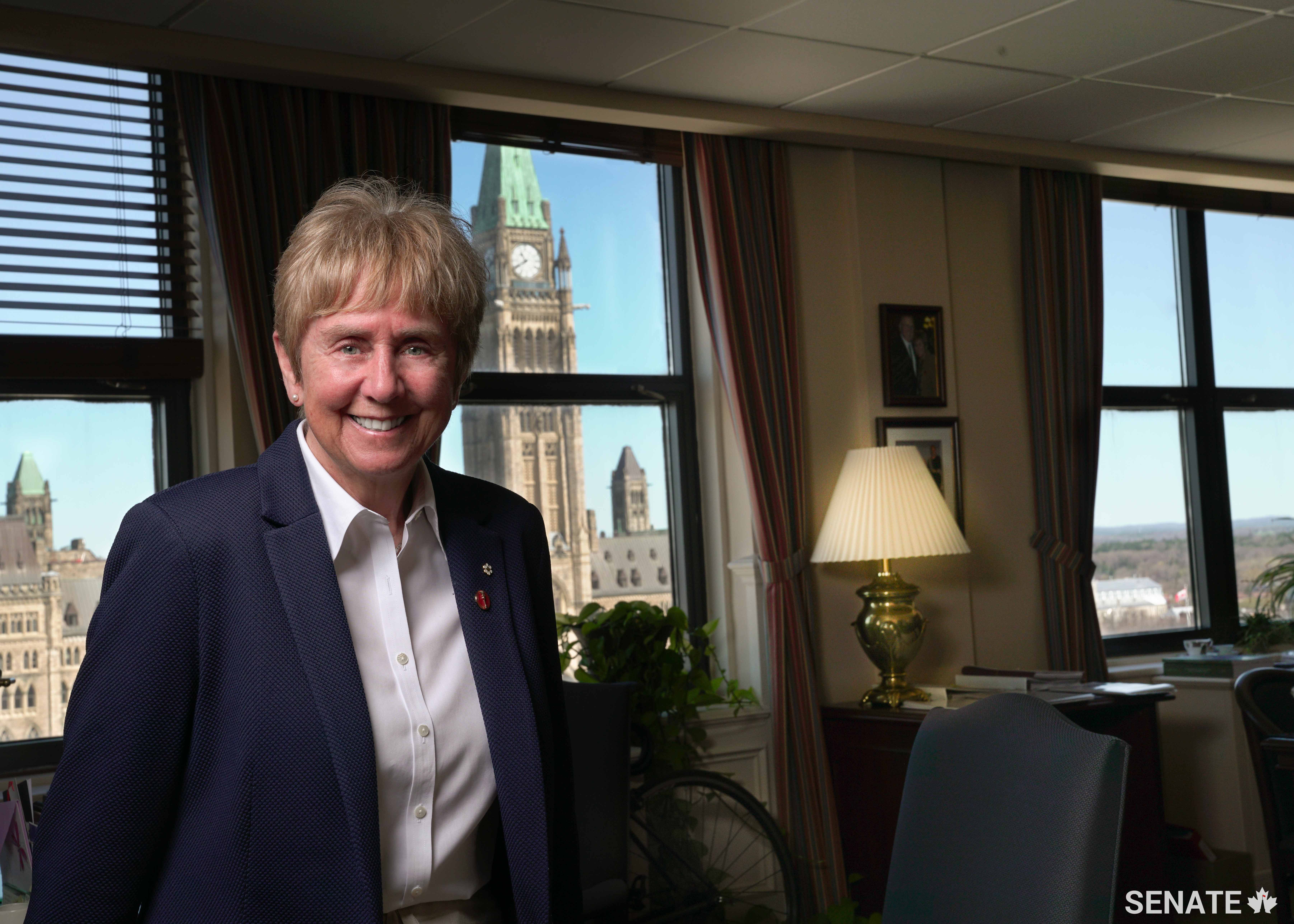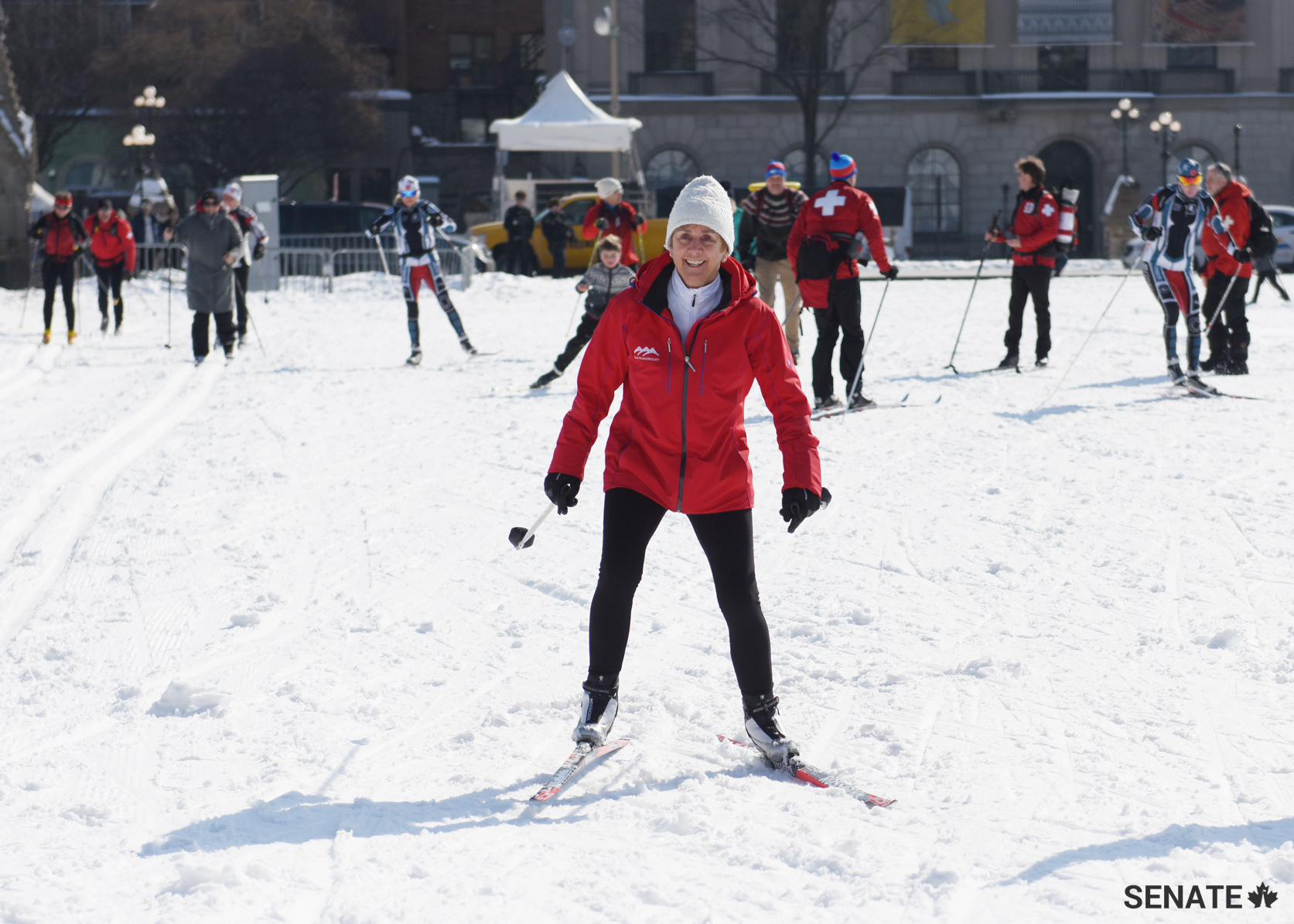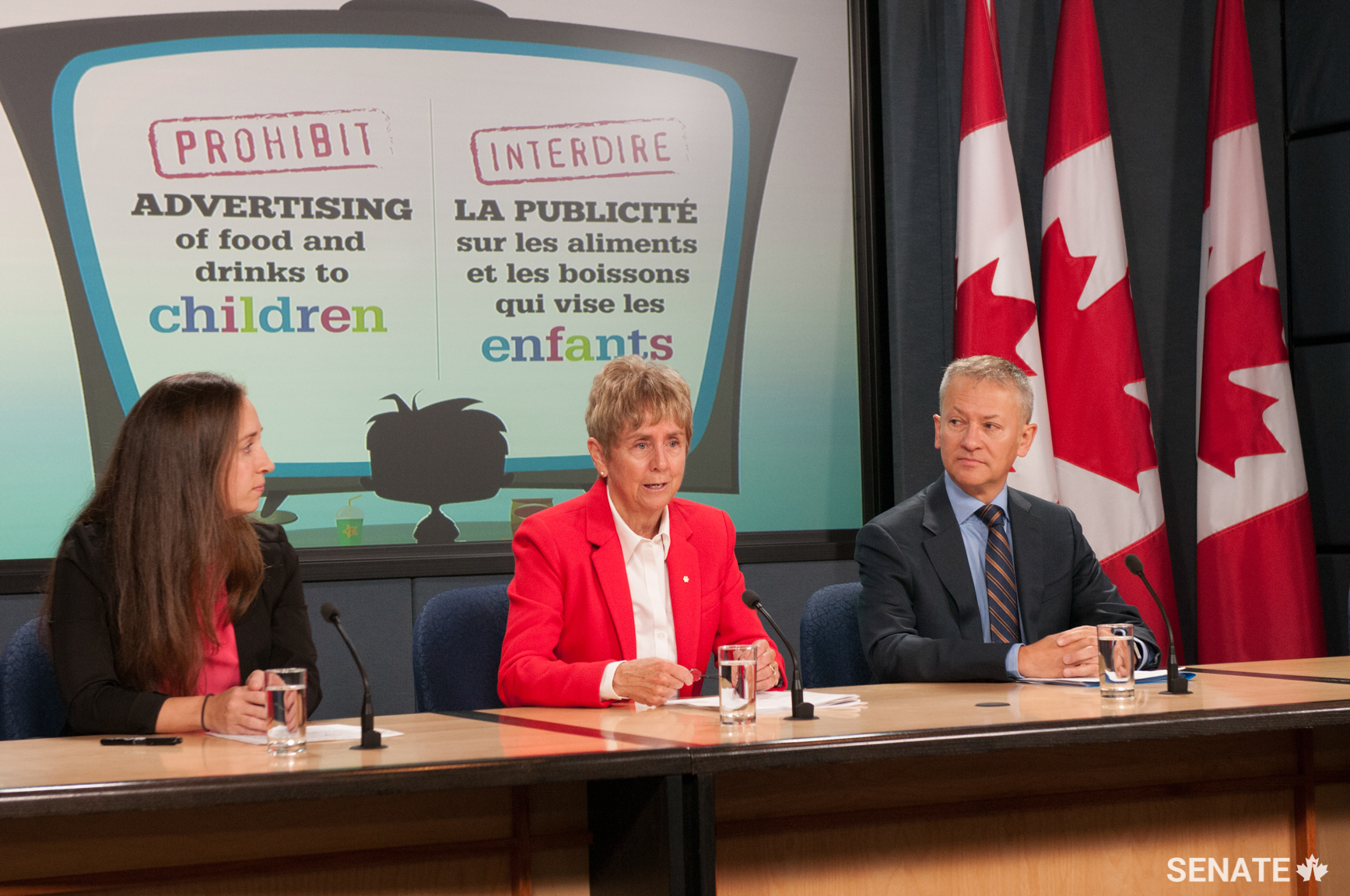‘A tremendous honour to serve’: Senator Nancy Greene Raine retires

Olympic gold medallist and world champion skier Nancy Greene Raine traded the mountains for Parliament Hill when she was appointed to the Senate in 2009.
Representing British Columbia, Senator Greene Raine quickly adapted to the demands of the Red Chamber. She became a valued member of several Senate committees, passed legislation to establish National Health and Fitness Day, and established herself as a national advocate for healthy, active lifestyles — always leading by example.
On May 11, 2018, Senator Greene Raine retired. In the lead up to her departure, she shared some reflections on her Senate career with SenCAplus.
 Senator Nancy Greene Raine takes a break from packing up her Parliament Hill office. She retired from the Senate on May 11, 2018.
Senator Nancy Greene Raine takes a break from packing up her Parliament Hill office. She retired from the Senate on May 11, 2018.
 Senator Nancy Greene Raine smiles in the sunshine during Ski Day on the Hill in February 2018.
Senator Nancy Greene Raine smiles in the sunshine during Ski Day on the Hill in February 2018.
 Senator Nancy Greene Raine speaks during a press conference to announce her Senate Public Bill S-228, the Child Health Protection Act, which would ban the marketing of unhealthy food and beverages to children.
Senator Nancy Greene Raine speaks during a press conference to announce her Senate Public Bill S-228, the Child Health Protection Act, which would ban the marketing of unhealthy food and beverages to children.
 Senator Nancy Greene Raine takes part in Bike Day on the Hill in June 2017.
Senator Nancy Greene Raine takes part in Bike Day on the Hill in June 2017.
How are you feeling about retirement?
You know it’s coming and all of a sudden it’s here. It comes to an end very abruptly.
I really enjoyed my time at the Senate. I’m sorry in a way that it’s ending, but it’s time. I think when you’ve served nine or 10 years, that’s probably long enough.
What was your most memorable experience as a senator?
When I think back to the highlights, for sure one of the most compelling debates that we had in the Senate was the debate over medical assistance in dying. I was so proud that, although people came from completely different points of view and different beliefs, in the end we all respected each other and got the job done.
Your Senate Public Bill S-228, the Child Health Protection Act, is very nearly law. Why did you want to craft a bill to ban the marketing of unhealthy food and drink to kids?
The report we did on the rising rates of obesity certain identified that marketing to kids was having a bad influence on their choices. I thought it would be a good idea to address that issue.
When I think back to my years growing up it was rare to for somebody to be fat. And I don’t know anybody, as a child in our school system, who was obese.
Look at what’s happened in the last 10-15 years — between computers in the schools and children getting access to lots of different devices, their total screen time is going from just watching television to now being on their devices as well. All that is sedentary activity. In hindsight, the impact of technology on childhood development was never understood and now we’re seeing some negative impacts.
It’s a socio-economic issue as well. Those families where the parents are educated and they have a healthy active lifestyle themselves, chances are they have a decent job and they’re not all stressed out.
But if you look at the people who don’t have easy access to healthy food, their family budgets are really stretched, mom and dad are both working and coming home tired — it’s really easy to give in.
There’s no silver bullet. There’s no one thing that will prevent this trend. But there’s no doubt in my mind that the targeted marketing of unhealthy food and beverages to children is bad.
How did your athletic career prepare you for the Senate?
When I think back to my ski-racing career it also lasted nine years, interestingly enough. I went to three Olympics and I only won in the third one because I was persistent and I had a lot of tenacity and I was very confident in my ability to be able to win. I just had to do the work.
In the Senate it’s a little bit the same thing. When you first come in you don’t really know how it all works.
One thing I’ve learned is there is no bad question. If you’re listening to the testimony of a witness in a Senate committee hearing and something comes up that piques your curiosity and you want to ask a question about it, ask the question. Because chances are the public also wants to hear. With that as my guideline I was really engaged in asking what I would call common-sense questions of the witnesses. And that’s how you bring out the information from the witnesses that we need to have to write our reports.
There are a lot of new senators taking their places in the Red Chamber — what advice do you have for them?
When I was appointed, I spoke to people before I came, to retired senators. And I said, “What am I supposed to do?” And the advice I got was, “Go there with your own intelligence and your background, and listen and learn and issues will find you.”
In the end, the issue that probably has defined me is something that I had learned about all my life, which is the value of a healthy, active lifestyle. But while I was in the Senate, I became very engaged in a lot of other issues — and so I would say that if you go in with a personal issue, an issue that you’ve been really involved with, don’t limit yourself to that single issue. Use your experience in life to get involved in many different kinds of issues that come forward in the Senate. Be broad-minded and have a broader outlook.
What will you miss about the Senate?
What I will miss is being engaged with a group of wonderful people on issues that impact Canada. It was a tremendous honour to serve. A real privilege, I would say.
I will always treasure these years and my memories, and the friendships that I made and not just with the other senators but with members of Parliament and people who work in the Chamber.
Which Senate accomplishments are you most proud of?
If the Child Health Protection Act is passed, I think that will be a legacy. We are all struggling with the health impacts of rising rates of obesity around the world. I think that would be my legacy — if it makes it to the finish line. We’re almost there.
I also passed the law to make National Health and Fitness Day the first Saturday in June. I’m very proud of that.
What’s next?
I’m retiring back home. My husband is the mayor of Sun Peaks, which is a ski village in the mountains outside Kamloops, population around 750 people, swelling to several thousand in the winter time. It’s a very exciting place to be involved in the community there.
I will stay active. Skiing, play tennis, cycling, golf, hiking — those are my favourite outdoor things. I’ll still follow what’s happening in the Senate. I’ll watch and see what’s happening, keep a little bit tuned in to the goings on in the Senate and certainly look forward to the continued good work by all the senators.
Related articles
Tags
Committee news
‘A tremendous honour to serve’: Senator Nancy Greene Raine retires

Olympic gold medallist and world champion skier Nancy Greene Raine traded the mountains for Parliament Hill when she was appointed to the Senate in 2009.
Representing British Columbia, Senator Greene Raine quickly adapted to the demands of the Red Chamber. She became a valued member of several Senate committees, passed legislation to establish National Health and Fitness Day, and established herself as a national advocate for healthy, active lifestyles — always leading by example.
On May 11, 2018, Senator Greene Raine retired. In the lead up to her departure, she shared some reflections on her Senate career with SenCAplus.
 Senator Nancy Greene Raine takes a break from packing up her Parliament Hill office. She retired from the Senate on May 11, 2018.
Senator Nancy Greene Raine takes a break from packing up her Parliament Hill office. She retired from the Senate on May 11, 2018.
 Senator Nancy Greene Raine smiles in the sunshine during Ski Day on the Hill in February 2018.
Senator Nancy Greene Raine smiles in the sunshine during Ski Day on the Hill in February 2018.
 Senator Nancy Greene Raine speaks during a press conference to announce her Senate Public Bill S-228, the Child Health Protection Act, which would ban the marketing of unhealthy food and beverages to children.
Senator Nancy Greene Raine speaks during a press conference to announce her Senate Public Bill S-228, the Child Health Protection Act, which would ban the marketing of unhealthy food and beverages to children.
 Senator Nancy Greene Raine takes part in Bike Day on the Hill in June 2017.
Senator Nancy Greene Raine takes part in Bike Day on the Hill in June 2017.
How are you feeling about retirement?
You know it’s coming and all of a sudden it’s here. It comes to an end very abruptly.
I really enjoyed my time at the Senate. I’m sorry in a way that it’s ending, but it’s time. I think when you’ve served nine or 10 years, that’s probably long enough.
What was your most memorable experience as a senator?
When I think back to the highlights, for sure one of the most compelling debates that we had in the Senate was the debate over medical assistance in dying. I was so proud that, although people came from completely different points of view and different beliefs, in the end we all respected each other and got the job done.
Your Senate Public Bill S-228, the Child Health Protection Act, is very nearly law. Why did you want to craft a bill to ban the marketing of unhealthy food and drink to kids?
The report we did on the rising rates of obesity certain identified that marketing to kids was having a bad influence on their choices. I thought it would be a good idea to address that issue.
When I think back to my years growing up it was rare to for somebody to be fat. And I don’t know anybody, as a child in our school system, who was obese.
Look at what’s happened in the last 10-15 years — between computers in the schools and children getting access to lots of different devices, their total screen time is going from just watching television to now being on their devices as well. All that is sedentary activity. In hindsight, the impact of technology on childhood development was never understood and now we’re seeing some negative impacts.
It’s a socio-economic issue as well. Those families where the parents are educated and they have a healthy active lifestyle themselves, chances are they have a decent job and they’re not all stressed out.
But if you look at the people who don’t have easy access to healthy food, their family budgets are really stretched, mom and dad are both working and coming home tired — it’s really easy to give in.
There’s no silver bullet. There’s no one thing that will prevent this trend. But there’s no doubt in my mind that the targeted marketing of unhealthy food and beverages to children is bad.
How did your athletic career prepare you for the Senate?
When I think back to my ski-racing career it also lasted nine years, interestingly enough. I went to three Olympics and I only won in the third one because I was persistent and I had a lot of tenacity and I was very confident in my ability to be able to win. I just had to do the work.
In the Senate it’s a little bit the same thing. When you first come in you don’t really know how it all works.
One thing I’ve learned is there is no bad question. If you’re listening to the testimony of a witness in a Senate committee hearing and something comes up that piques your curiosity and you want to ask a question about it, ask the question. Because chances are the public also wants to hear. With that as my guideline I was really engaged in asking what I would call common-sense questions of the witnesses. And that’s how you bring out the information from the witnesses that we need to have to write our reports.
There are a lot of new senators taking their places in the Red Chamber — what advice do you have for them?
When I was appointed, I spoke to people before I came, to retired senators. And I said, “What am I supposed to do?” And the advice I got was, “Go there with your own intelligence and your background, and listen and learn and issues will find you.”
In the end, the issue that probably has defined me is something that I had learned about all my life, which is the value of a healthy, active lifestyle. But while I was in the Senate, I became very engaged in a lot of other issues — and so I would say that if you go in with a personal issue, an issue that you’ve been really involved with, don’t limit yourself to that single issue. Use your experience in life to get involved in many different kinds of issues that come forward in the Senate. Be broad-minded and have a broader outlook.
What will you miss about the Senate?
What I will miss is being engaged with a group of wonderful people on issues that impact Canada. It was a tremendous honour to serve. A real privilege, I would say.
I will always treasure these years and my memories, and the friendships that I made and not just with the other senators but with members of Parliament and people who work in the Chamber.
Which Senate accomplishments are you most proud of?
If the Child Health Protection Act is passed, I think that will be a legacy. We are all struggling with the health impacts of rising rates of obesity around the world. I think that would be my legacy — if it makes it to the finish line. We’re almost there.
I also passed the law to make National Health and Fitness Day the first Saturday in June. I’m very proud of that.
What’s next?
I’m retiring back home. My husband is the mayor of Sun Peaks, which is a ski village in the mountains outside Kamloops, population around 750 people, swelling to several thousand in the winter time. It’s a very exciting place to be involved in the community there.
I will stay active. Skiing, play tennis, cycling, golf, hiking — those are my favourite outdoor things. I’ll still follow what’s happening in the Senate. I’ll watch and see what’s happening, keep a little bit tuned in to the goings on in the Senate and certainly look forward to the continued good work by all the senators.


